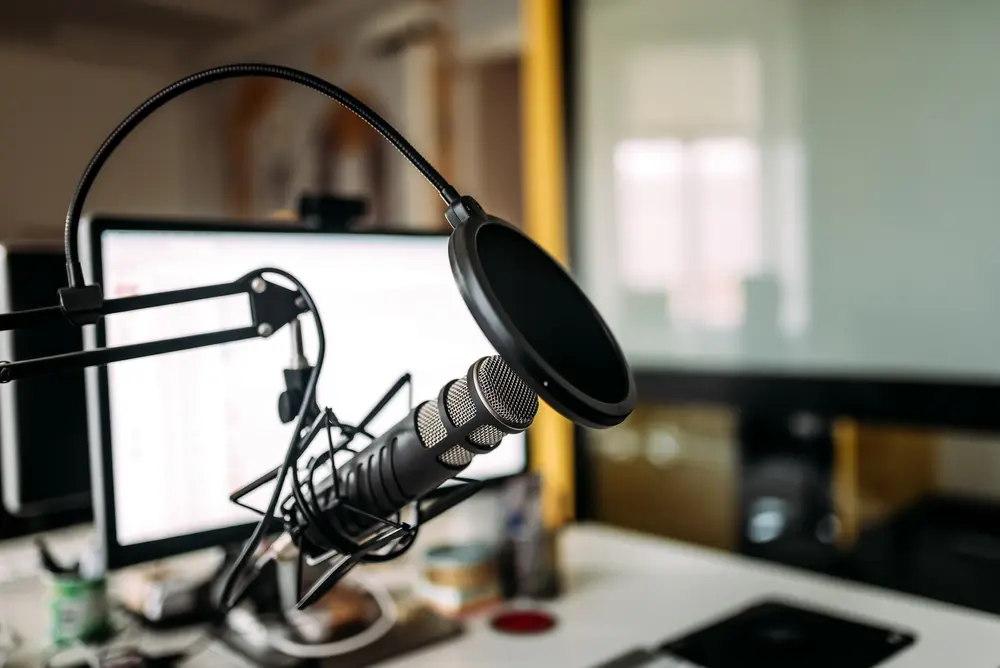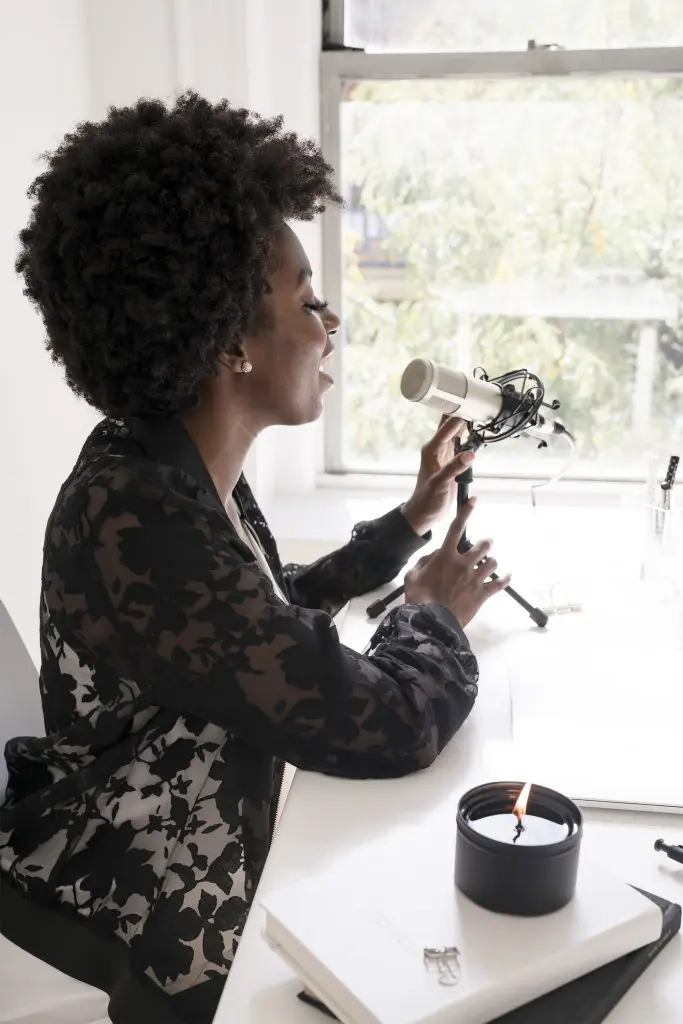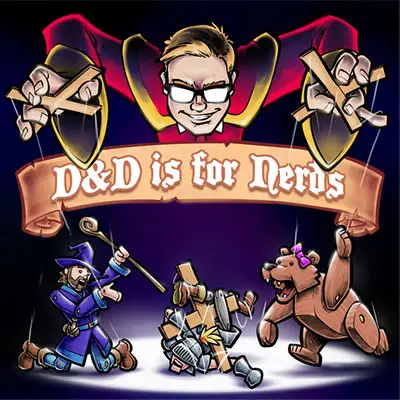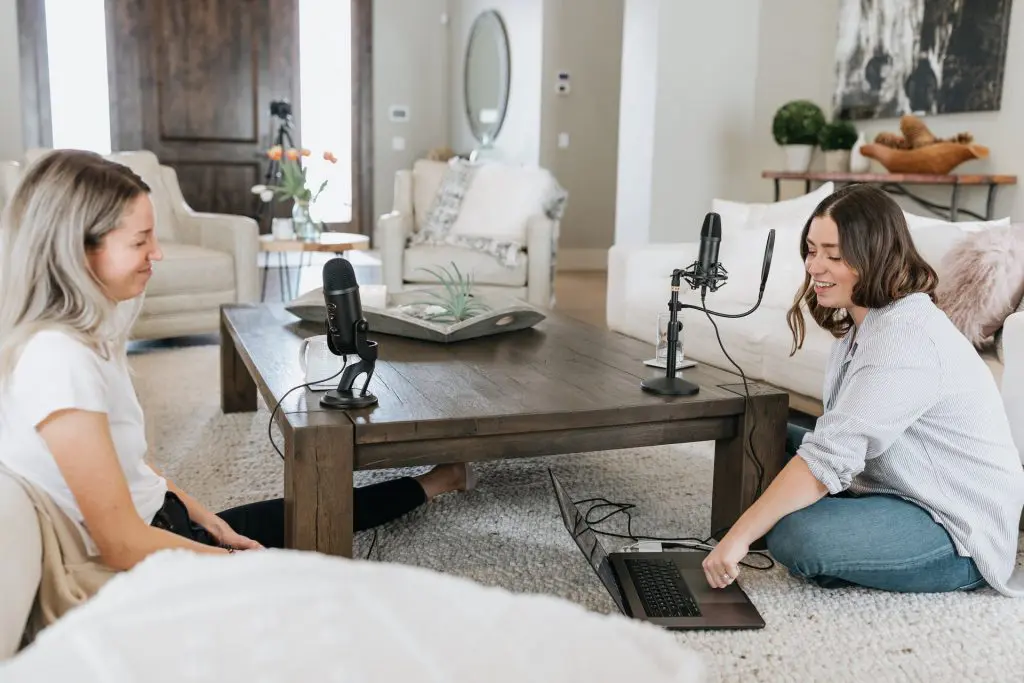If you are thinking about starting your own podcast and want to know where to start or wondering what you are letting yourself in for, then these ten steps will lay it out for you clearly and practically.
Making a successful podcast at home doesn’t have to be expensive and anyone can get started. You don’t need to be hiring out a studio and, with a little planning, you can be up and running in no time.

Podcasts have become so popular in recent years. In fact, there are currently over 850,000 active podcasts and podcast listeners in the US have grown by 54% in three years.
Why the sudden jump in people wanting to listen to podcasts? Three out of four people say it’s because they want to learn more which is a beautiful way to think about your podcast and what you can offer the world with your show.
Podcast quality has also undoubtedly jumped in the last few years with essential tech like microphones becoming more affordable and free editing software and online editing classes making the creation of podcasts more accessible to people.
With podcasts becoming more mainstream, now is a great time to get into this fulfilling hobby and potentially earn yourself active and passive income while you’re doing it.

Keys to Successful Podcast
From coming up with an idea to the best editing software, and how to market and monetizing your podcast here’s everything you need to know about the wonderful adventure that is podcasting.
1) How to come up with a great podcast idea
There’s not really any such thing as being too niche for a podcast because there’s so much in this world for us to explore and, given the sheer popularity of podcasts, people will find you no matter the topic. There are lots of things to consider when starting a successful podcast but here are some simple things you can do to get the ball rolling.
How to come up with a fresh podcast idea:
- What are you passionate, and most importantly, excited about? You’ll likely be coming back to this topic a lot and spending a lot of time with this topic in-depth. Your excitement will be one of the things that come across most clearly.
- Think of three topic ideas and come up with ten ideas for great shows. Whichever one is easiest for you (in terms of knowledge, research, and production) is the winner.
- If you don’t have an area of interest that you’re an expert in but you want to discuss certain topics then start by inviting guests and sharing their stories.
- Look for gaps in the market. What can you bring to the table?
- Come up with an elevator pitch. Can you sum up this podcast idea in one sentence? You should be able to.
2) How to name your podcast
Coming up with a catchy podcast name is so important. It’s the first thing people judge you on (other than your artwork). Once you’ve come up with your brand, you will need to name your podcast in a way that clearly relates to your niche or brand, or at least piques people’s interests with a pun or a funny reference.
To make things easier, you can also use a podcast name generator like the AI-powered Riverside Name Generator.
Note: Many people name the show after themselves but I’d be wary of doing this unless you already have an established platform and a recognisable name elsewhere. That being said, once your podcast gains traction, your name will become synonymous with your brand so don’t stress out too much about the name.
Most important is to pick something you know you’ll be happy with the whole way through your journey. Rebranding is a timely process that can lose valuable listeners and is always best avoided!
A few great podcasts names for inspiration:
- Stuff You Missed In History Class
- Lore
- The Bunker
- You’re Wrong About
- The Guilty Feminist
- Harry Potter and the Sacred Texts
- Let’s Fight A Boss
Read More:16 Best Podcasts for Freelancers and Digital Nomads
3) How to record your podcast from home:
There’s absolutely no need to hire a studio to start making a podcast and, unless you have access to a studio (through a friend or through uni, for example), I wouldn’t recommend starting off with this kind of expenditure over your head.
Launching a good quality podcast from home requires a few things to get started. You can typically find these things second hand, rent, or even borrow them from someone if the cost is an issue at the beginning.
Equipment you need to start a podcast from home:
- A USB mic. Some great ones include Blue Snowball Mic, Blue Yeti (on cardioid setting), Samson Q2U. Whichever mic you go for, picking one with a cover and cardioid setting will provide the highest quality.
- Any laptop (you can even rent one if you don’t have one).
- A 3 meter USB extension cable (optional) – this means you can move away from your computer (particularly great if you have a loud fan).
Find a comfortable space where you can record, ideally somewhere that isn’t echoey.

4) How to edit your podcast & podcast editing tips
Editing is essential for anyone looking to work with audio, luckily, it’s not as scary as it sounds. With a few simple (and free!) tools you will be recording and editing your podcast like a pro. You can also watch classes on sites like Skillshare which can teach you everything you need to know from industry experts.
Podcast Editing Software:
Audacity — This is the perfect software for editing your podcast after the show. It’s simple to use and free! If you don’t want to edit, you can also just use it to add your intro and outro. If there is more than one person talking then make sure you all clap at the start to sync the audio which makes it much easier to work with post-production.
Editing tip: Make sure to edit out any awkward silences, mistakes, and ums and ahs (note that it’s worth leaving some in so that it sounds conversational and natural). You can use your own judgment on what sounds great in terms of the tone of your show.
Other popular editing software include: Logic Pro X (for Mac), Garageband (for Mac), and Adobe Audition.
Recording multiple podcasts guests:
There are tools available to make recording multiple voices a breeze. Try Zencastr or Riverside.fm which run in your browser or Anchor (which can also help you distribute and monetize your podcast) for recording guests across the internet. Y
ou send everyone the link and it will save everyone’s file individually, and then it’s easy to sync up in an editor like Audacity after.
Note: You can also hand over your podcast editing to a freelancer, for example on Fivver. This can be from £50 upwards so it could be something you want to think about later to save you time. There are also multiple online podcast production companies you can work with. For example, many of the podcasts I enjoy use PodMaster to produce their content.
5) How to create your podcast logo and intro music
You’ll need some eye-catching artwork that represents your podcast. It can be really simple but it needs to feature the podcast name prominently. You can easily pay someone on Fivver to do this for you or get creative yourself on Photoshop.
While an amazing tool, be wary of using Canva, especially their pre-made templates if you don’t want to run into any copyright issues down the line.
For royalty-free music for your intro and outro, you can head to Audio Library (on YouTube) or Epidemic Sound or just google ‘royalty-free sounds’ you can also ask someone on Fivver to make you a custom tune.
It’s important to find royalty-free music or your podcast can be taken down. Be careful when using any licensed sounds within your podcast as there are rules about how long sounds can be played before your run into copyright issues.
Here are some of our favourite examples:



5) Deciding where to launch your podcast
The easiest thing to do is upload your podcast to Soundcloud and then use an RSS feed which will distribute the show to major podcast providers such as Spotify, Itunes, and Acast.
You will need to be signed up for these platforms yourself first. You can use the free version of Soundcloud to do this but premium offers you some extra features like scheduling your episodes.
Tip: Soundcloud have a great step-by-step podcast guide for helping you with this process.
6) How to get guests for your podcast
Maybe you already have people in mind who you would love to interview. Otherwise, you’re going to need to do some research.
Guests should typically be related to, or knowledgeable about, your niche in some way. You can do research via Google or LinkedIn to find industry experts or even put out calls in Facebook groups relevant to your topic. You can also call out in bigger groups that have a range of people (such as Female Digital Nomads).
You’ll want to DM whoever you have in mind to get their email (if you don’t have it already). Then just send them a professional email introducing yourself and your podcast with a link to a few episodes. Explain briefly why you want them specifically on your podcast and mention some things they have done that you respect.
Tip: Make it easy for them to accept with a Google Calendar invite with the date and time set up and follow up a few days before the event.
7) How to promote your podcast
Marketing is such a huge part of creating a successful podcast so it’s not something to sleep on.
Think about where your audience is likely to be but generally an Instagram and Facebook page dedicated to your podcast is the minimum. You can also easily use paid ads on Facebook to get that initial boost too.
Tiktok can be a great medium for sharing snippets of your podcast and it’s also got great reach (for now); plus it’s especially popular with the Gen Z and Millenial audience.
You can also reach out to publications that typically cover podcasts or websites within your niche for review or coverage. Sometimes a simple shout-out can go a long way and be mutually beneficial so reach out to other new podcasts, especially if they are in your niche, as your audiences will probably have a lot of overlap.
Remember that it will take time for your podcast to start getting the numbers you want but like with any platform, consistency is absolutely the key here. People want to see regular uploads so sticking to a schedule that you can imagine is as important as marketing yourself well.
Many podcasters opt for once a week but if you know you can only consistently upload once a fortnight or once a month, that’s fine too. Just stick to a schedule!

8) How to set up a website for your podcast
This isn’t necessary and, maybe something to do a little while after you’ve launched, but providing another way for people to find you and your podcast is only a good thing.
It only needs to be a simple, single-page site for people to land on but you can also upload transcripts, interesting notes from the podcast to the site which you can then refer people to at the end of the show.
Make sure you have all your social media, details about you and your podcast, a way to contact you, a link to your media kit, and possibly a newsletter sign-up so you can let people know of upcoming shows and behind-the-scenes details.
It’s easy to set up a website with Squarespace, WordPress (+ a simple, lightweight theme like Generatepress and hosting from companies like Bigscoots or Siteground), or Wix.
9) Consider starting a Patreon
While mostly associated with YouTubers, Patreon is a great way to build a community around your podcast as well as a stable monthly income.
Podcasters often wonder what they can offer in terms of perks and some simple ones, which work for me as an avid podcast listener and Patreon subscriber include:
Receiving a private RSS feed so I can hear the podcast a day early, without ads, or with an extra segment exclusively for Patreon backers. One podcast I subscribe to does all three and I would genuinely never consider removing my pledge because it’s just such a nice perk!
Special live gatherings – I’ve seen people perform a live ‘podcast’ on zoom with guests which Patreon backers can join, watch, and submit questions. If you can commit to two or three of these a year
10) Monetize your podcast
There are so many ways to monetize your podcast. If you’re looking for something other than Patreon, or in addition, then why not try some of these ideas:
- Sponsorship or promotion – reach out to brands you like who may be interested in sponsoring an ad on your podcast with a polite letter and your media kit. Make sure they authentically represent your brand
- Audio ads – Similar to Youtube ads, these are an easy way to make money off a podcast. Companies such as Midroll or Anchor can put ads on your podcasts
- Live shows and events – Similar to the Patreon idea, these live shows can be ticketed and feature special guests.
If you enjoyed this article about getting started with podcasting then please consider sharing.

